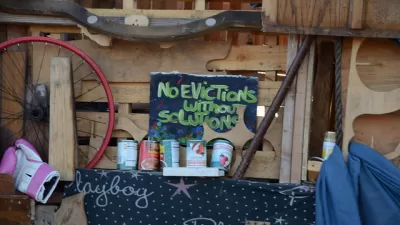Other cities could learn from efforts to lower eviction rates in Charlotte, North Carolina.

When groundbreaking research revealed that evictions in Charlotte, North Carolina are nearly twice as frequent as in similar-sized cities, the University of North Carolina and Mecklenburg County wanted to know more. The two partnered to take a deeper look at the frequency, causes, and impacts of eviction in Charlotte—ultimately motivating the county to devote new resources to legal aid and eviction defense, one step in combatting the crisis.
In hopes of replicating the partnership's success in other cities, Urban Institute's Leah Hendey distilled their work into five basic strategies. Here are a few:
-
The partnership heard from a number of parties involved in the eviction process, including county agencies, nonprofits, legal aid, landlords, apartment associations, and the sheriff's office.
-
They mapped out the entire eviction process, including informal evictions that never make it to court. That helped them identify the most crucial junctures and key opportunities for intervention.
-
They combined awareness with action. Alongside reports on new dimensions of the eviction crisis, the partnership published a "Toolkit for Action." Following the reports, Hendey notes, "the United Way and Mecklenburg County increased their funding for legal assistance for people facing eviction, with the county funding Legal Aid of North Carolina to provide this assistance for the first time in the fiscal year 2019 budget."
FULL STORY: Five ways Charlotte, North Carolina, deepened its understanding of its eviction crisis

Maui's Vacation Rental Debate Turns Ugly
Verbal attacks, misinformation campaigns and fistfights plague a high-stakes debate to convert thousands of vacation rentals into long-term housing.

Planetizen Federal Action Tracker
A weekly monitor of how Trump’s orders and actions are impacting planners and planning in America.

In Urban Planning, AI Prompting Could be the New Design Thinking
Creativity has long been key to great urban design. What if we see AI as our new creative partner?

King County Supportive Housing Program Offers Hope for Unhoused Residents
The county is taking a ‘Housing First’ approach that prioritizes getting people into housing, then offering wraparound supportive services.

Researchers Use AI to Get Clearer Picture of US Housing
Analysts are using artificial intelligence to supercharge their research by allowing them to comb through data faster. Though these AI tools can be error prone, they save time and housing researchers are optimistic about the future.

Making Shared Micromobility More Inclusive
Cities and shared mobility system operators can do more to include people with disabilities in planning and operations, per a new report.
Urban Design for Planners 1: Software Tools
This six-course series explores essential urban design concepts using open source software and equips planners with the tools they need to participate fully in the urban design process.
Planning for Universal Design
Learn the tools for implementing Universal Design in planning regulations.
planning NEXT
Appalachian Highlands Housing Partners
Mpact (founded as Rail~Volution)
City of Camden Redevelopment Agency
City of Astoria
City of Portland
City of Laramie




























